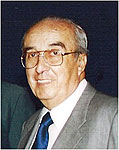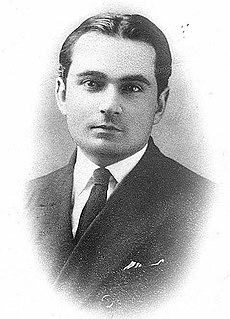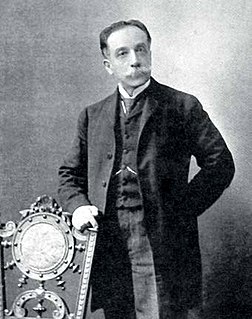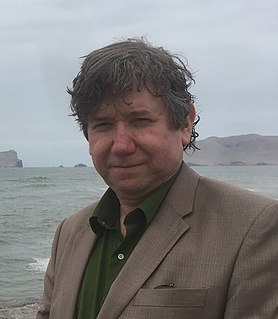
José María Arguedas Altamirano was a Peruvian novelist, poet, and anthropologist. Arguedas was an author of Spanish descent, fluent in the native Quechua language, gained by living in two Quechua households from the age of 7 to 11 - first in the indigenous servant quarters of his step-mother's home, then, escaping her "perverse and cruel" son, with an indigenous family approved by his father - who wrote novels, short stories, and poems in both Spanish and Quechua.

The National University of San Marcos is a public research university in Lima, the capital of Peru. Also known as the University of Peru and the "Dean University of the Americas", it is the first officially established and the oldest continuously operating university in the Americas. Since its foundation, it was commonly referred as the "Royal and Pontifical University of the City of the Kings of Lima" until the Viceroyalty period and as of now, it is referred to as Universidad Nacional Mayor de San Marcos or La Decana de América.

Luis Antonio Eguiguren Escudero was a Peruvian educator, magistrate, historian and politician. He was the director of the General Archive (File) of the Nation (1914), Alderman of Lima (1914–1920), Mayor of Lima (1930), President of the Constituent Congress (1930–1932), founder and leader of the Peruvian Social Democratic Party. He won the Peruvian presidential election of 1936, but his victory was ignored by the Congress and the then-President Oscar R. Benavides, who claimed that he had won with votes of the APRA. He presided over the Supreme Court and the Judiciary in 1953 and 1954.

Marco Aurelio Denegri Santagadea was a Peruvian intellectual, literary critic, television host and sexologist.

Rodolfo Cerrón Palomino is a Peruvian linguist who has crucially contributed to the investigation and development of the Quechuan languages. He has also made outstanding contributions to the study of the Aymara, Mochica and Chipaya languages.

Alejandro Romualdo was a Peruvian poet of the 20th century. His best known work is the Song of Tupac Amaru, exalting the revolutionary spirit of the 18th-century leader. The poem, which glorified the Peruvian independence movement, won the Peruvian National Prize for Poetry in 1997.

Carlos Thorne was a Peruvian novelist, writer and lawyer. He is regarded as one of the most original and innovative Peruvian writers of the second half of the 20th century. This is due to his unique blend of avant garde flashback techniques, following Malcolm Lowry and James Joyce, with historical detail and accuracy, to the point of reproducing the Spanish of the Conquistadores.
Antonio Alfonso Cisneros Campoy was a Peruvian poet, journalist and academic. He was born in Lima on 27 December 1942 and died there of lung cancer on 6 October 2012, aged 69.

Antonio Cornejo Polar was a Peruvian-born academic, teacher, literature and cultural critic, known particularly for his theorization of the concept of "heterogeneity."

Jorge Alfredo Basadre Grohmann was a Peruvian historian known for his extensive publications about the independent history of his country. He served during two different administrations as Minister of Education and was also director of the Peruvian National Library.
Zoé Jiménez Corretjer is an author from Puerto Rico. She is a professor in the Department of Humanities, University of Puerto Rico at Humacao.
Consuelo Hernández is a Colombian American poet, scholar, literary critic and associate professor of Latin American studies at American University since 1995.

Alejandro Octavio Deustua Escarza was a Peruvian philosopher, educator and statesman. He was the Prime Minister of Peru from 9 August 1902 until 4 November 1902.

José Antonio Mazzotti is a Peruvian poet, scholar, and literary activist. He is Professor of Latin American Literature and King Felipe VI of Spain Professor of Spanish Culture and Civilization in the Department of Romance Studies at Tufts University, President of the International Association of Peruvianists since 1996, and Director of the Revista de Crítica Literaria Latinoamericana since 2010. He is considered an expert in Latin American colonial literature, especially in El Inca Garcilaso de la Vega and the formation of criollo cultures, a critic of Latin American contemporary poetry, and a prominent member of the Peruvian 1980s literary generation. He received the José Lezama Lima special poetry prize from Casa de las Américas, Cuba, in 2018, for his collection El zorro y la luna. Poemas reunidos, 1981-2016.

Javier Mariátegui Chiappe was a renowned Peruvian intellectual and psychiatrist. He was the last of the children of José Carlos Mariátegui and Anna Chiappe. Studied at the University of San Marcos where he also started teaching; he was also a founder of Cayetano Heredia University. He was also the founding director of the National Institute of Mental Health “Honorio Delgado - Hideyo Noguchi”. He died in Lima.
Julio Mario Luqui-Lagleyze is an Argentine historian. Born in Buenos Aires in 1959 received a degree in History in 1982. He specializes in Hispano-American Military and Naval History and Military Museology. He is currently studying for his PhD in History at the Universidad Católica Argentina.
Teobaldo Nina Mamani is a painter and teacher. Originally from Moquegua, Peru, Nina attended school at Esc. Bellas Artes in Lima under the tutelage of Ángel Cuadros. Nina has won multiple awards for his work, including but not limited to Premio de Dibujo de Esc. Bellas Artes. Segundo Premio Mitchell y Cía. Mención Honrosa and X Concurso Nacional de Artistas Jóvenes ICPNA.
Pablo Macera was a Peruvian historian.
Jesús María Isabel Romero Wiesse was a Peruvian poet, writer, essayist, anthologist, and film critic.












